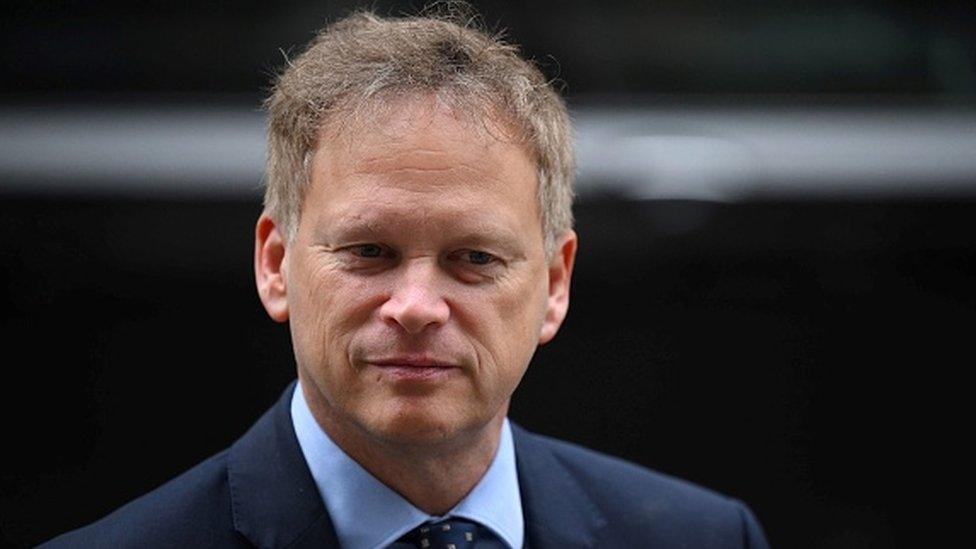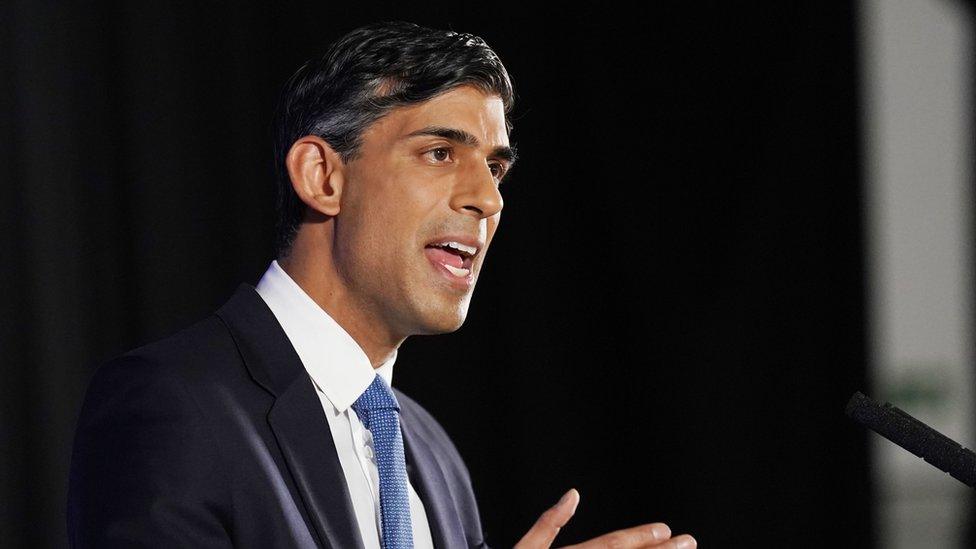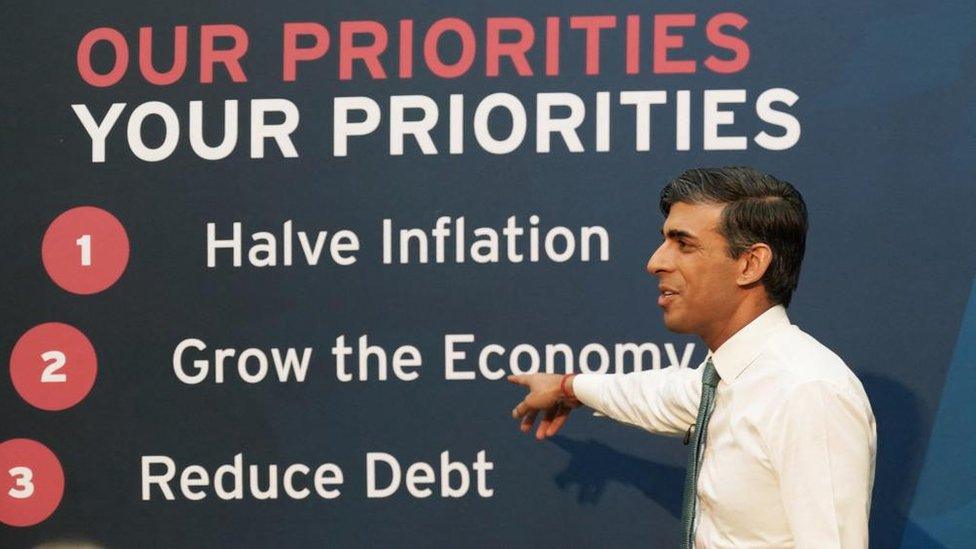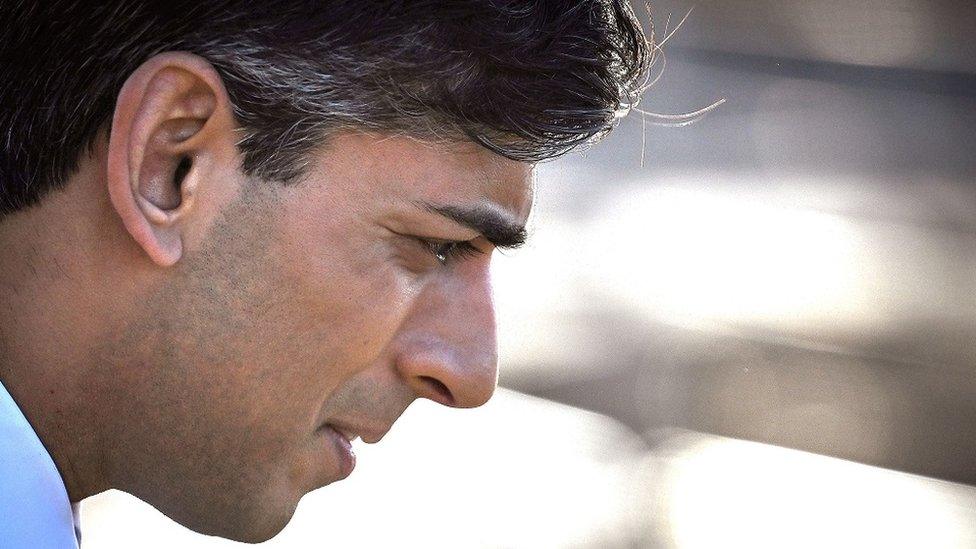Sunak reshuffle: Shapps named energy secretary in department shake-up
- Published
Political correspondent Ione Wells on the PM's changes to his top team - and why it matters
Prime Minister Rishi Sunak has appointed Grant Shapps as the new energy and net zero secretary in a shake-up of government departments.
The former department which covered business and energy has been broken up as part of the reorganisation.
Greg Hands has replaced Nadhim Zahawi after the former Tory party chairman was sacked over his tax affairs.
A promotion also comes for Lucy Frazer who will head a streamlined department of culture, media, and sport.
Mr Sunak's top team of ministers meet on Tuesday afternoon to discuss the changes.
Opposition parties say reorganising government departments will cost taxpayers millions of pounds and suggest Mr Sunak's reshuffle is a sign of weakness.
But the government says the changes will help departments focus on the prime minister's priorities.
The government said the new Department for Energy Security and Net Zero will be "tasked with securing our long-term energy supply, bringing down bills and halving inflation".
The soaring cost of energy bills - partly driven by the war in Ukraine - is one of the key factors hampering the UK economy, which Mr Sunak has pledged to grow.
Mr Sunak promised last summer, when he was campaigning to be Conservative leader, to re-establish a standalone department for energy.
On the creation of the new department, Mr Sunak said he wanted "the country to have greater energy security and independence because we can't be held to ransom by hostile foreign countries".

Grant Shapps has been appointed as the new secretary of state for energy security and net zero
He described the new energy secretary, Mr Shapps, as "one of our most capable and experienced ministers".
Labour's shadow climate and net zero secretary, Ed Miliband, said "rearranging of deckchairs on the sinking Titanic of failed Conservative energy policy will not rescue the country".
Meanwhile, Mr Sunak's changes see business and trade merged in one department, headed by Kemi Badenoch, and the creation of a new department focused on science, innovation and technology, led by Michelle Donelan.
Ms Donelan will remain in charge of steering the controversial Online Safety Bill - which aims to prevent harmful material on the internet - through Parliament.
The government says its new Department for Science, Innovation and Technology will drive innovation and create new and better-paid jobs.
The Department for Business and Trade - incorporating the former Department for International Trade - will "support growth by backing British businesses at home and abroad, promoting investment and championing free trade".
Other announcements include Graham Stuart remaining as climate and energy minister, George Freeman appointed as a science, innovation and technology minister, and Rachel Maclean made a housing minister.
There have been no changes to the position of Dominic Raab, the deputy prime minister. The BBC understands Mr Sunak is waiting for a report into bullying allegations against Mr Raab before deciding on his future.

New cabinet appointments in full:
Grant Shapps, secretary of state for energy security and net zero
Kemi Badenoch - secretary of state for business and trade
Lucy Frazer, secretary of state for culture, media, and sport
Michelle Donelan, secretary of state for science, innovation and technology
Greg Hands, Conservative Party chairman

Mr Hands - formerly a trade minister - will play a key role in Conservative campaigning before local elections in May and a general election expected next year.
He takes the role just over a week since Mr Zahawi was sacked after an inquiry found he had breached the ministerial code for failing to disclose his tax affairs were under investigation.
The timing of the reorganisation surprised some in Mr Sunak's party.
The Liberal Democrats have drawn attention to the cost of rearranging departments as well, citing research by the Institute for Government think tank, external.
The think tank has estimated the cost of setting up a new government department at £15m, potentially rising to £34m "when including loss of productivity as staff adjust to the new organisation".
Mr Sunak has been under pressure to assert his authority over his government and party since taking office in October last year, following the resignation of two prime ministers in a period of heightened political turbulence.
But his government has been dogged by political controversies in recent weeks and the Conservatives continue to trail Labour in the opinion polls.

It's a fair bet many voters won't be that fascinated by the tinkering with Whitehall machinery.
But it's a very Rishi Sunak reshuffle. There was no political pantomime. No parade of the hired and fired up Downing Street. After the seemingly endless reshuffles of last year's Tory party implosion, Mr Sunak has decided to rejig government structures rather than play another round of ministerial musical chairs. So, his Cabinet looks largely the same. He's done nothing to rile his restive parliamentary party.
But the prime minister's slicing and dicing of government departments does say a lot about his priorities. Most obviously the importance he places on science and innovation in the quest for economic growth. Rishi Sunak, remember, is a Stanford MBA. A California business school graduate who absorbed a "start up" mentality he's now applying to some parts of Whitehall.
He's certainly not the first prime minister to believe re-wiring and re-badging government departments can deliver long-term results.
But with strikes rolling on, a cost of living crisis and his deputy under investigation for bullying, Rishi Sunak's short-term problems haven't gone away either.
Related topics
- Published4 January 2023

- Published28 January 2023

- Published30 January 2023
